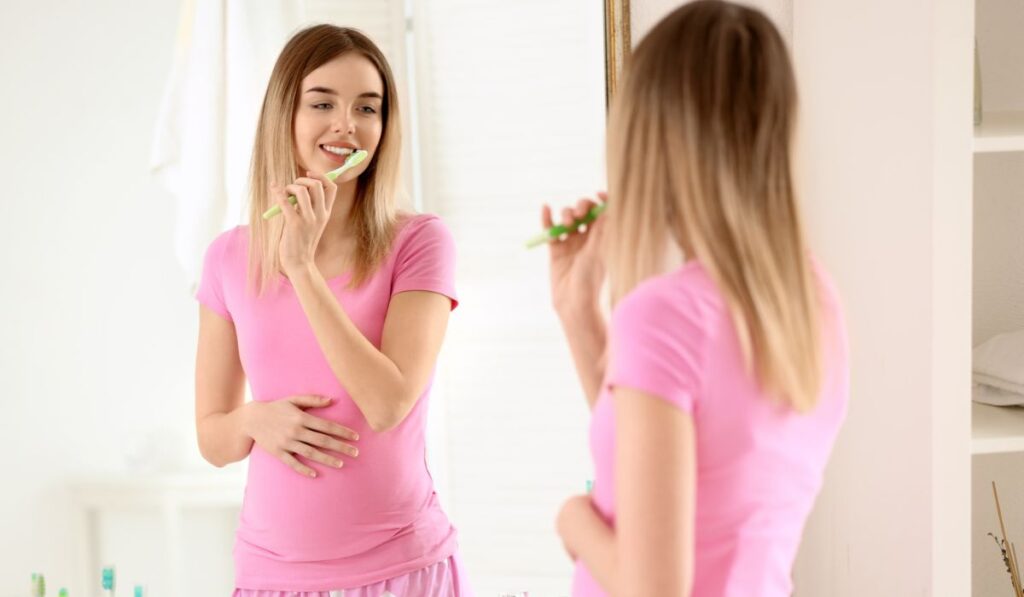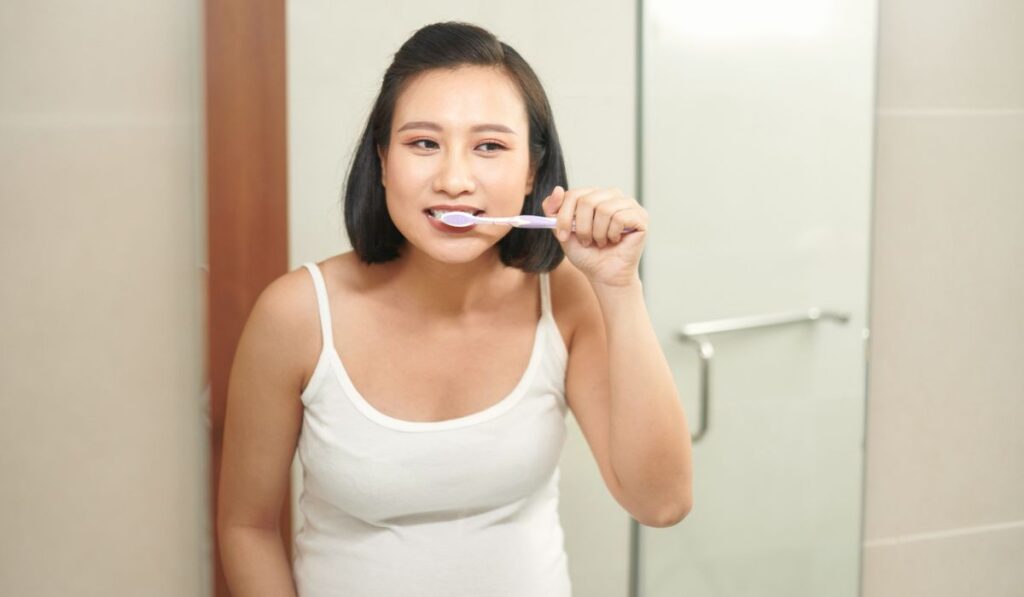Brushing your teeth is a crucial routine, even during pregnancy. However, many mothers-to-be are concerned that the ingredients in toothpaste will harm them or their unborn babies. So, should you still use toothpaste while you’re pregnant?
You should still use toothpaste if you’re pregnant, especially ADA-approved brands that contain fluoride. The toothpaste you use should be free from irritating ingredients, artificial sweeteners, dyes, and flavors like mint, which can trigger morning sickness.
There are many safe kinds of toothpaste to use during pregnancy. Let’s take a closer look at the options and some important things to keep in mind as you care for your teeth during pregnancy.
Why Is Oral Care Important When Pregnant?

A good oral hygiene routine during pregnancy helps you minimize bacterial buildup, swollen gums, inflammation, and soreness. It’s also important for your baby’s health. Studies have shown that periodontitis (gum disease) is a risk for premature births and could also lead to underweight infants.
Notably, pregnancy gingivitis occurs due to various changes that occur during pregnancy, including hormonal build-up. This can make your gums puffy, tender, red, and very sensitive. At this point, however, you shouldn’t stop brushing your teeth.
Dentists recommend sticking to your oral care routine, but make sure you use a soft-bristled brush (on Amazon). You should also floss carefully every day to remove stuck food particles that may harbor bacteria and worsen pregnancy gingivitis.
If you experience morning sickness, you should be more careful while brushing your teeth. Some women reportedly have this sick feeling when they open their mouths wide as they clean their teeth. Experts advise that you try using a smaller toothbrush, like the ones recommended for children.
You also might want to adjust your brushing schedule by switching to late morning hours. If you vomit from brushing, rinse out your mouth with clean water and rest for 30 minutes, after which you can finish cleaning. During this time, smearing your teeth lightly with toothpaste will help you freshen your mouth.
You may also develop reflux during pregnancy. This means acids from the stomach can push back up to your throat. It usually happens because the baby is pressing up against your stomach, especially when you rest.
When this happens, the acid gives you a burning sensation that keeps you awake, and it could also damage your teeth.
Dental experts recommend eating small meals more often and sleeping with extra pillows to reduce reflux. And if you wake up after reflux, rinse out your mouth thoroughly with clean water and wait half an hour before you clean your teeth.
Brushing straight away will damage your teeth because the acid is still present in your mouth.
What Kind of Toothpaste Should You Use if You’re Pregnant?
The best kinds of toothpaste to use if you’re pregnant are those that don’t contain potentially irritating ingredients. They should be free from artificial sweeteners, dyes, and flavors that could trigger your morning sickness.
Since toothpaste aversion is common during pregnancy, dentists recommend toothpastes with non-mint flavors. There are also various flavor-free options that work just fine. Whichever you choose, be sure to use a soft toothbrush and floss regularly.
These are 5 great toothpaste options you can use during pregnancy:
- Tom’s of Maine Natural Wicked Fresh (on Amazon)
- Tom’s of Maine ADA Approved Fluoride Toothpaste (on Amazon)
- Boka Ela Mint Natural Toothpaste (on Amazon)
- Dr Sheffield’s Certified Natural Toothpaste (on Amazon)
- Hello Natural Wild Strawberry Fluoride Toothpaste (on Amazon)
Which Toothpastes Should You Avoid if You’re Pregnant?
The kinds of toothpaste you should avoid during pregnancy are those with ingredients like parabens, triclosan, preservatives, artificial sweeteners, and dyes.
If you’re more vulnerable to canker sores, you should also avoid toothpaste with Sodium Lauryl Sulfate (SLS). This is a foaming agent found in most kinds of toothpaste, and it can cause gum irritation if it gets into small cuts and lesions.
There isn’t sufficient research or evidence that teeth whitening is safe during pregnancy, so dentists generally warn that teeth whitening products may irritate your gum tissues and lead to more discomfort and inflammation.
If your teeth and gums are sensitive during pregnancy, you should avoid whitening products to be on the safer side.
Should You Be Worried About Fluoride in Toothpaste if You’re Pregnant?

You shouldn’t be worried about fluoride in toothpaste if you’re pregnant. The American Dental Association (ADA) recommends using fluoride toothpaste during pregnancy.
Moreover, no scientific studies have linked fluoride to birth defects and other health problems during pregnancy.
While most expectant mothers believe fluoride toothpaste will negatively affect their babies’ growth, development, and health, this isn’t true. In fact, fluoride compounds like sodium monofluorophosphate help prevent tooth decay and build strong enamel.
Understandably, mothers-to-be are often concerned, especially if they see news articles and blogs claiming that fluoride-based products are harmful. This makes them buy into the fear that fluoride toothpaste is directly linked to congenital disabilities, premature births, or even cancer.
If you prefer to use non-fluoride toothpaste options nonetheless, dentists recommend you opt for remineralizing toothpaste. Those with ingredients like hydroxyapatite, dicalcium phosphate, and xylitol can protect your tooth enamel against decay.
Hydroxyapatite is a natural substance, which is also found in the enamel to keep teeth strong. Dicalcium phosphate is a gentle abrasive that helps remove tough food particles stuck on the teeth. Xylitol is a substance that prevents cavity-causing bacteria from growing on your teeth and releasing acids.
It is recommended to go back to your normal routine and use fluoride-containing toothpaste once the baby is born.


